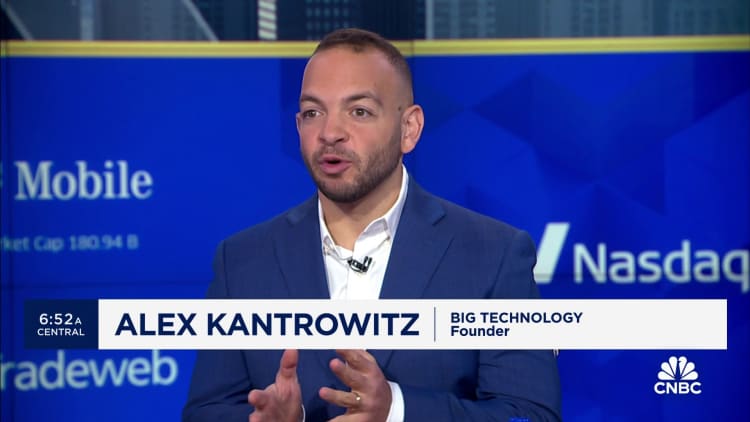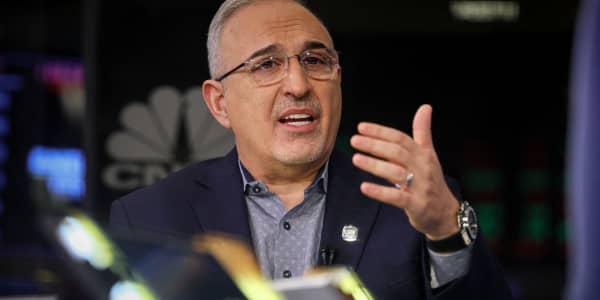Watercoolers and cubicles are dens of distrust when it comes to artificial intelligence, which has emerged as a significant force over the past year.
While both rank-and-file workers and the C-suite see AI as a great opportunity for business transformation, both sides are skeptical over its deployment. The recent rise in layoffs, especially in the tech sector, isn't helping to stem that distrust either.
Experts say that while there is widespread AI anxiety no matter which side of the desk a person sits on, having leaders enthusiastic about AI as well as providing clear communication on how it will impact and alter employee jobs is critical for its long-term success.
"There is a lot of anxiety around, but there are actually a lot of opportunities, and employees aren't getting that message because employers aren't getting that message," said Emily Rose McRae, a senior director and analyst at Gartner who leads its future of work teams. McRae said many employers have anxiety over AI and pass that on to their employees. Employers, McRae said, need to better educate themselves about the opportunities and benefits of AI. And then, she added: "People need to hear from employers, 'Here are our plans.'"
According to a recent survey from HR software company Workday, 62% of business leaders welcome AI's arrival in the workplace. Employees are even more tepid in embracing AI, with just 52% welcoming it.
McRae said that employers are often uncertain about where or how to deploy AI, leading to some trepidation. Once they see how AI can increase productivity and create new opportunities, they'll spread their enthusiasm for AI to employees. However, they must communicate clearly and show how AI will help workers.
"There is media messaging that AI will take jobs, and vendors are pushing products that show how you can use AI to eliminate jobs, so people are anxious about it," McRae said.
McRae said that employers should explain that if an employee's role needs to be reimagined, they'll have a conversation and see other ways the employee can contribute to the company. All of this, she said, will help build trust with workers.
Ensuring that workers trust both companies and AI
Trust is a critical currency that executives need to cultivate, said Patrick Flynn, an assistant professor of human resources management at North Carolina State University. What widens the gulf between bosses and workers, he adds, is that workers now have to trust twice.
"From a subordinate, lower-level employee's perspective, they have to trust two different actors, the leader and the AI," Flynn said. Thus, two parallel processes of cultivating trust are playing out.
Employers need to build trust by explaining how and why the systems were developed so that workers can believe AI-driven systems will benefit them and that the AI operates within a set of acceptable values.
Flynn said business leaders need to teach employees how to use AI to be better.
"I don't think it will replace jobs, but it will transform jobs and roles within companies," Flynn adds, and employers need to prepare employees for that.
The evolving world of work in the age of AI
Atif Rafiq, CEO of AI start-up Ritual, agrees that the technology will transform jobs and that the next 18 to 24 months will be a period of adapting and adopting AI and figuring out where the boundaries are.
Rafiq said AI will become increasingly crucial in taking over some legacy tasks and administrative work while freeing up employees to unleash creativity and solve problems.
"Originating new knowledge is very different from administrating things the company already knows," Rafiq said. He adds that many employees will shift to problem-solving and cultivating creativity. But humans are still needed and will continue to be required to initiate innovation.
"Humans can define problems and ask the right questions; AI can speed a lot of that up, do the research, and shore up the blank spots," Rafiq said. He adds that humans' contribution is still vital, but AI will accelerate their accomplishments. "That is an exciting message, that is a growth message," Rafiq said, adding that exciting messages can help drive out fear and dissolve distrust.
Rafiq also said today's CEOs will be judged tomorrow by how they usher in the new era of AI, so addressing distrust is critical.
"If you are the CEO of a global company, your legacy will be determined by your actions and whether they are people-centric or 100% focused on the bottom line," said Rafiq, adding that these are moral and personal legacy questions for those running companies today.
Jim Stratton, Workday's chief technology officer, said of this firm's recent AI survey results, "What surprised me the most is that so many individuals and companies don't know how they will use AI," Stratton said. "And on the individual side, so many folks lack trust."
The role of companies over the months ahead is to build a bridge across the divide and help employees walk over it.
Stratton said for a company to bridge the trust gap successfully, it needs to implement a four-step process: Defining and setting out your principles; putting together a responsible AI strategy; developing an AI risk management framework; and developing a plan for how and where to communicate about AI clearly.
Stratton said that adjusting to AI will test boundaries, but in the end, opportunity awaits.
"AI has the potential to disrupt many types of work, but it also provides the opportunity to help individuals reskill and learn to do things in a new way," Stratton said.
Correction: Jim Stratton is Workday's chief technology officer. An earlier version of this article misidentified him.

To join the CNBC Workforce Executive Council, apply at cnbccouncils.com/wec.





